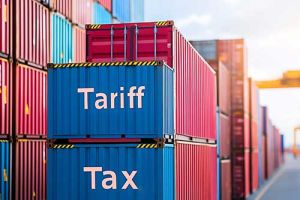Smart Banking Strategies to Stay Ahead
 Minnesota First is committed to helping you reach your financial goals with easy, convenient, and stress-free banking solutions. Whether saving for the future, managing everyday expenses, or making a major purchase, understanding how economic changes—like tariffs—impact your finances is key to staying financially secure.
Minnesota First is committed to helping you reach your financial goals with easy, convenient, and stress-free banking solutions. Whether saving for the future, managing everyday expenses, or making a major purchase, understanding how economic changes—like tariffs—impact your finances is key to staying financially secure.
While tariffs may seem like something that only affects businesses or global trade, they can influence everything from the price of everyday goods to the interest rates on your savings and loans. The good news is that with the right financial strategies and support from Minnesota First, you can mitigate their impact and stay on track toward your financial goals.
What Are Tariffs and Why Do They Matter?
A tariff is a tax placed on imported goods, making them more expensive. Governments impose tariffs to:
- Protect domestic industries by encouraging consumers to buy from local businesses.
- Generate revenue that can be used for public services and infrastructure.
- Balance trade relationships by adjusting the cost of imported goods.
- Respond to trade disputes, sometimes leading to price increases for both businesses and consumers.
While tariffs aim to regulate trade and support domestic industries, they often result in higher prices on everyday items, which can directly impact household budgets.
How Tariffs Affect Your Everyday Finances
1. Higher Prices on Everyday Goods
When tariffs make imported products more expensive, businesses often pass those costs on to consumers. That means you may notice price increases on:
- Groceries: Imported foods, including fruits, vegetables, and meats, may become more expensive.
- Household Items: Electronics, appliances, and home improvement materials could see price hikes.
- Clothing and Personal Items: Products made with imported fabrics and materials may cost more.
- Gas and Transportation: Tariffs on oil imports can raise fuel prices, increasing commuting and travel costs.
How to Stay Financially Strong:
While rising costs can be concerning, there are simple banking strategies to help offset their effects:
- Use a Cash-Back or Rewards Credit Card. Earn points or cash back on everyday purchases to maximize your spending. Paying off your balance in full each month can help you avoid high-interest charges.
- Shop Smart and Buy Local. Purchasing from local farmers’ markets, American-made brands, and domestic retailers can help avoid tariff-related price hikes.
- Time Your Purchases. Stock up on non-perishable essentials when on sale, and consider making big-ticket purchases before new tariffs take effect.
2. Interest Rate Changes on Loans and Savings
Tariffs can contribute to inflation, which may prompt the Federal Reserve to adjust interest rates to stabilize the economy. These changes can significantly impact both borrowers and savers:
- If you’re borrowing: Higher interest rates may increase the cost of mortgages, auto loans, and personal loans. If you’re planning a major purchase, now may be a good time to discuss your options with a Minnesota First banker to lock in the best rate.
- If you’re saving: Higher interest rates often mean better returns on savings accounts and Certificates of Deposit (CDs). Now could be a great time to maximize your savings strategy by:
- Opening a High-Yield Savings Account provides easy access to your funds while earning competitive interest.
- Investing in a Certificate of Deposit (CD) offers higher, locked-in rates if you don’t need immediate access to your money.
Other ways to strengthen your savings include:
- Automate Your Savings: Setting up automatic transfers to your savings account ensures consistent growth, even during uncertain times.
- Staying Informed: Minnesota First lists all current bank rates on our website, so you can always access the latest savings and lending opportunities.
3. Increased Cost of Living and Budgeting Challenges
As prices rise due to tariffs, many households may need to adjust their budgets to maintain financial stability. This might mean:
- Cutting back on non-essential spending
- Finding ways to save more on essential purchases
- Exploring higher-yield savings options to keep up with inflation
Smart Debt Management Strategies:
If tariffs are affecting your cost of living, now is a good time to review your debts and financing options:
- Refinance High-Interest Debt: If interest rates are still manageable, refinancing loans or consolidating debt could help secure lower payments.
- Pay Down Variable-Rate Debt: If interest rates are rising, prioritizing credit card and variable-rate loan payments can protect you from increasing costs.
- Consider a Personal Loan for Large Purchases: If you’re facing unexpected expenses or planning a major purchase, a Minnesota First personal loan may offer a more affordable financing option than using high-interest credit cards.
Minnesota First: Your Partner in Navigating Economic Changes
At Minnesota First, we know that economic changes—like tariffs—can create uncertainty, but we are here to help you stay financially strong.
Whether you need:
- A high-interest savings account to maximize your earnings
- A flexible loan option to help with major purchases
- Financial guidance to make smart banking decisions
Our team is ready to provide the support and solutions you need.
Stay Informed and Plan for the Future
Economic factors like tariffs may be outside your control, but how you manage your money is in your hands. By staying informed, making strategic banking decisions, and working with a trusted financial partner like Minnesota First, you can stay ahead of rising costs and continue working toward your financial goals.
